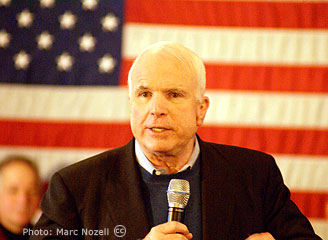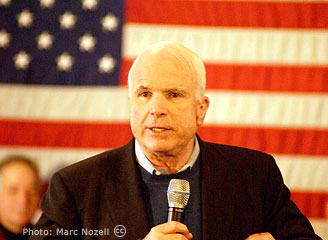 Sen. John McCain says he’s still a proud proponent of using a cap-and-trade system to reduce greenhouse-gas emissions, but he’s not going to back President Barack Obama’s climate agenda any time soon.
Sen. John McCain says he’s still a proud proponent of using a cap-and-trade system to reduce greenhouse-gas emissions, but he’s not going to back President Barack Obama’s climate agenda any time soon.
McCain, coauthor of multiple cap-and-trade bills in the past, addressed an energy symposium sponsored by the Reform Institute on Tuesday. In his remarks, he called for bipartisanship on climate and energy policy — but offered scathing criticism of the Obama administration’s plans, calling them “irresponsible, ill-conceived.”
“The budget the president recently put forward undermines our ability to work in a bipartisan fashion on this issue,” said McCain. “The president and his administration have risked our country’s economic future with a tax, borrow, and spend policy of historic proportions.”
“What the Obama administration has proposed is not cap-and-trade,” he continued. “It’s cap-and-tax.”
McCain’s main concern is that Obama calls for all of the emission credits in his cap-and-trade plan to be auctioned off to polluters, rather than dispersed free of cost. The Obama plan would bring in tens of billions a year in revenues from auctioning credits, the majority of which would be returned to citizens through tax rebates. It would also dedicate $15 billion per year to energy investments.
“The president’s proposal of auctioning 100 percent of the carbon credits is bad economic policy that would cost businesses billions of dollars and allow for little or no transition into a low-carbon system,” said McCain. “Let me be clear. I am a supporter of a strong cap-and-trade system, but I will not and cannot align myself with a giant government slush fund that will further burden our businesses and consumers.” McCain said he favored “a limited number of credits” being auctioned off to help fund a cap-and-trade program, but he argued that the vast majority should be distributed to emitters free of charge.
“At this time of economic hardship, it is beyond irresponsible to further raise costs of the operation of this country’s businesses,” he continued. “I still believe that it is the time to address this critical international issue, but my vision for a cap-and-trade system is as a mechanism to lower greenhouse gases in our atmosphere, not as a revenue generator for the federal government.”
McCain contended that the Obama administration is trying to create a “slush fund to pay for health-care reform or other social programs that fit with this administration’s agenda” — despite the fact that Obama’s plan clearly spells out that the money should be spent on consumer rebates and energy technology. (Senate Majority Leader Harry Reid of Nevada said last month that he was open to the possibility of using auction revenues to fund health care, but later backed away from the idea.)
McCain also wants support for the nuclear-power industry in a climate bill. “You have no complete answer without nuclear power,” he said. And he criticized the Obama administration for cutting funding for the proposed nuclear-waste storage facility at Yucca Mountain, Nev., saying the admin “refuses to deal with the issue of nuclear-waste storage.”
McCain will be a key figure in negotiations over a climate bill. In the Senate, it will take 60 votes to pass such a bill, and Democrats hold only 58 seats (well, 59 if you count Al Franken). So even if Democratic leaders get all of their own party members on board (and that’s a long shot), they’ll need to woo at least one Republican over to their side. Since McCain introduced cap-and-trade bills with Joe Lieberman (I-Conn.) in 2003, 2005, and 2007, there had been speculation that he might be willing to work with Democrats on this issue. That looks less likely now.
After spending much of his speech bashing the Obama administration, McCain closed by telling the crowd, “It’s time to put partisanship behind us.”


